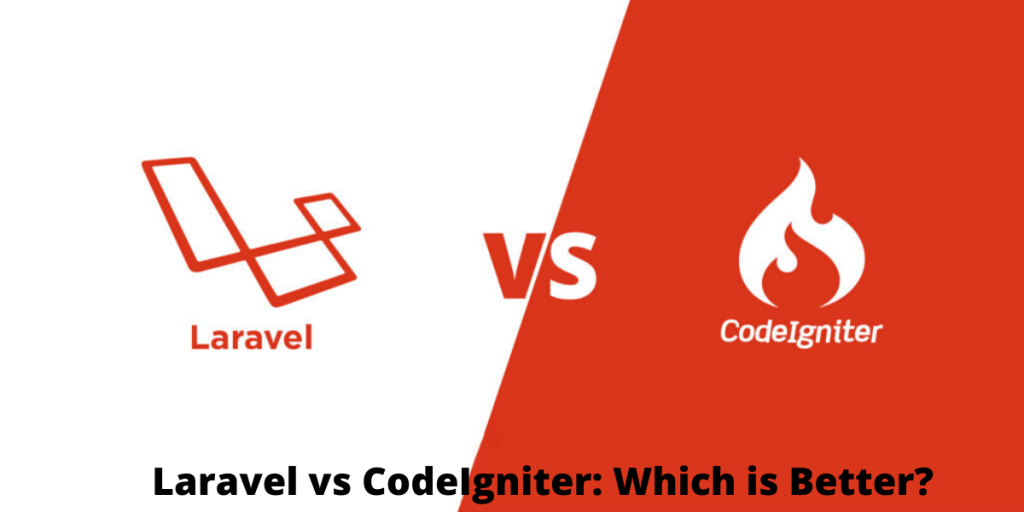Laravel vs CodeIgniter Which is Better to Use
From the last few years, we have observed that various businesses across the world choose to go with PHP framework whenever they want custom solutions. There are a wide number of frameworks currently present in the market, but the two most popular frameworks are Laravel and CodeIgniter.
Lately, we have found that a lot of debate is happening on which framework to choose from the listed PHP frameworks for the next project. To resolve this issue for one and all, here we will provide complete a difference between Laravel and Codeigniter.

Laravel is an open-source popularly used PHP framework. It is specially released for the development of web application utilizing the MVC platform. Hence, the project developed in this framework are properly structured and manageable.
The framework is released under the MIT License. Hence, its source code is hosted on GitHub. It is a definitive PHP framework as it follows expressive and proper language rules.
What is CodeIgniter?
CodeIgniter is a robust, agile and open PHP framework. This simple toolkit allows developers to create full-featured web apps and dynamic websites.
It offers full freedom for the users because they don’t have to just hang with the MVC development pattern. Apart from this, they consist of various third-party plugins that are highly beneficial to integrate complex functionalities.
After getting a basic understanding of both frameworks. Now, we will provide a detailed comparison of both frameworks.
Laravel vs CodeIgniter: Which is Better?
Structure and Updates
Laravel: It operates on the MVC structure of filing. It consists of a built-in command-line tool known as Artisan.
CodeIgniter: It also possesses MVC (model-view-controller) and offers quick boarding. The structure is not exactly like the object-oriented programming. Therefore, various developers utilize it as per their needs.
Demand and Current trends
Laravel: Laravel is the most demanding PHP framework as of now. It consists of the most eloquent coding style that is liked by seasoned developers.
CodeIgniter: It allows to easily operate in 2.x, and hence various developers prefer to go with CodeIgniter.
Modularity
Laravel: Various developers desire to work on web development by dividing it into separate modules. Laravel framework is designed with inherent modularity features. It gives an option to developers to divide the project into smaller modules for quick development.
CodeIgniter: It doesn’t consist of inherent modularity features. Therefore, CodeIgniter developers have to develop and maintain modules using a Modular Extension in a project.
Database
Laravel: It supports ORACLE, Microsoft SQL Server, IBM DB2, MYSQL, PostgreSQL. Apart from this, it also supports Eloquent ORM, which allows a developer to work with various databases efficiently. Moreover, it can instantly respond to the database and carry out basic tasks using models.
CodeIgniter: It supports popular databases such as MySQL, Microsoft BI, MongoDB, and PostgreSQL. Apart from this, it also supports popular databases such as Microsoft SQL Server, DB2, Orcable, and some others.
Template Engine
Laravel: It consists of a basic yet powerful in-built template engine known as Blade. This engine plays a significant role in laravel development services by speeding up the performance of the web application.
CodeIgniter: It doesn’t consist of an inherent template engine. Therefore, developers have to add it using a template tool such as smarty. This allows them to look after primary tasks and enhance the performance of a site.
Routing
Laravel: It is highly effective and adaptable at the time of sending routing requests. While clearly listing out the majority of the routes, laravel developers also have the option of reverse routing.
CodeIgniter: It supports implicit as well as explicit routing.
Support for RESTful API
Laravel: RESTful controllers enable Laravel developers to make a variety of RESTful APIs without allocating much of their time.
CodeIgniter: It doesn’t allow effective development of REST APIs.
Authentication
Laravel: Authentication class feature in Laravel allow developers to execute authentication and authorization rules.
CodeIgniter: It doesn’t consist of any authentication features. Hence, CodeIgniter developers have to authenticate as well as permit users by developing custom extensions.
Unit Testing
Laravel: It enables developers to verify the app code completely and continuously using the PHPUnit.
CodeIgniter: It doesn’t consist of any inherent unit testing tools. Hence, developers have to utilize additional unit testing tools to check the quality of the app and code.
Online Help and Libraries
Laravel: It provides official documentation which can easily be understood. Moreover, a developer can also get more help from the Laracast.com.
CodeIgniter: It provides a lot of built-in functionality, and their site consists of a useful guide which any developer can utilize to use without any kind of prior knowledge.
Learning Curve
Laravel: It consists of a lot of tools as well as features. Due to this, it is challenging for beginners to understand a set of complex features.
CodeIgniter: Developers can easily learn and understand CodeIgniter in a very short amount of time.
Community Support
Laravel: It has the biggest community worldwide. It possesses 56.2 stars and more than 17K members on the GitHub. Hence, web developers find it quick to find any solution to the problem. Also, a conference with the name Laracon is organized every year where all the members of the community gather and discuss the latest developments going on with the framework.
CodeIgniter: It possesses 17.7 stars and 7.8 members on the GitHub. Anyone can resolve their issue within some time as it provides an exclusive CodeIgniter community support.
Conclusion: Laravel Vs CodeIgniter
Here, we can say that both frameworks have their own purpose and benefits. But, we can say firmly that Laravel is more powerful as compared to CodeIgniter. Hence, if you have made a decision to develop a website using Laravel framework, you can approach a professional laravel development company. They will deliver you the best solution by considering your requirements and current market scenario.



